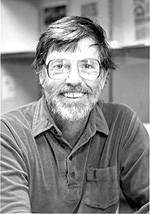Dear Friends,
Please join us on June 4 at UCSC in the Kresge Town Hall for a Memorial to celebrate the life of Bob Edgar, visionary Founder of Kresge College, distinguished scientist, dedicated teacher, spirited conservationist, educational innovator, beloved husband and father, and treasured mentor, colleague, and friend. On the first of February this year, Bob died peacefully at home. He was 85 years old.
We will gather in a Circle of Friendship on Saturday, June 4, from 1-4 at the Kresge Town Hall.
The Kresge Town Hall is adjacent to the Owl's Nest (cafe) in Kresge College’s upper street. Parking is available in the parking structure on the corner of Heller and McLaughlin Drive or in the lower Kresge parking lot.
Please contact Carolyn Martin Shaw at cmclark@ucsc.edu if you have any questions. If you are unable to attend, but would like to send a message, you may also send it to that email address.
Yours in loving memory of living and learning,
Carolyn Martin Shaw
For Kresge College and Carol Proudfoot-Edgar
Robert Edgar, the founding provost of Kresge, a pioneering genetic researcher and member of the National Academy of Sciences, died on the 1st of February. Edgar earned his bachelor's degree at McGill University in Montreal and Ph.D. in biology at the University of Rochester. While on the faculty at the California Institute of Technology, Edgar received the Molecular Biology Award from the National Academy of Sciences for pioneering research on "bacteriophage T4", a virus that infects E. Coli bacteria.
In 1969, Professor Edgar came to UC Santa Cruz, and in 1971 he became the founding provost of Kresge College. Early in his work at UCSC, Edgar focused on undergraduate education, and fostered innovations in teaching, and the cultivation of egalitarian and participatory principles. In a 1970 memo on his founding vision for the college, Edgar described Kresge (then called College Six) as an experiment in "participatory, consensual, democracy," and argued that the new community should test the premise that "people are creatively alive to the extent that they perceive themselves as freely responsible for shaping their own destinies."
As a biologist, Edgar played leading roles both in virology and in the important use of the worm Caenorhabditis elegans as a model system for the study genetic factors in the death of cells (John Sulston, 2002 Nobel Laureate Lecture). Edgar was also a key participant in then-Chancellor Robert Sinsheimer's 1985 workshop at UCSC, that established the feasibility of sequencing the human genome, and planted the seed for what later became the International Human Genome Project.
Edgar is survived by his partner of 40 years, Carol Proudfoot-Edgar; his two sons, Bruce and Chris Edgar; and two grandsons, Nico and Noah. His full obituary can be found here.

